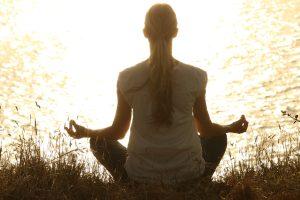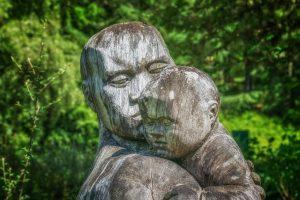Have you ever witnessed a captivating performance that transported you into another world, leaving you in awe of the actor’s authenticity and emotional depth? What if we told you that behind that mesmerizing portrayal lies a profound connection between...

Have you ever witnessed a captivating performance that transported you into another world, leaving you in awe of the actor’s authenticity and emotional depth? What if we told you that behind that mesmerizing portrayal lies a profound connection between Zen philosophy and the art of acting? Welcome to the realm where mindfulness, focus, meditation, and non-attachment intertwine with the transformative power of the stage.
As actors, we are constantly seeking ways to bring characters to life, to breathe authenticity into their words and actions. It is an ongoing quest to move beyond mere recitation and deliver performances that touch the hearts and minds of our audience. In this pursuit, we often find ourselves tapping into the wellsprings of our own emotions, navigating complex relationships, and delving into the depths of the human experience.
But how can we take our craft to the next level? How can we truly embody a character and evoke genuine emotions that resonate with others? The answer lies in embracing the wisdom of Zen philosophy, a path that leads us to mindfulness, focus, meditation, and unattachment. These profound practices not only enhance our personal well-being but also infuse our performances with an unmistakable essence of truth.
The renowned acting teacher Stella Adler once said, “Life beats down and crushes the soul, and art reminds you that you have one.” Similarly, the legendary Stanislavski remarked, “Love the art in yourself, not yourself in the art.” These profound insights illuminate the transformative potential of merging Zen principles with the art of acting. By embracing mindfulness, focus, meditation, and non-attachment, we can transcend the limitations of our own ego and become vessels for the creative energy that flows through us.
In these ideas that follow, we embark on an inspirational journey, exploring practical exercises and action steps that will empower you to take your performance to new heights. Whether you are a seasoned actor or just beginning to tread the boards, these insights will awaken your spirit, ignite your imagination, and unlock the dormant reservoirs of your artistic potential.
So, let us venture together into the world of Zen and the art of acting. Let us delve into the power of mindfulness, focus, meditation, and non-attachment, and discover how they can elevate our performances from the page to the stage. Are you ready to embark on this transformative path? Let us begin.
Embracing Mindfulness for Authenticity
Understanding the Present Moment
On the stage, every moment is an opportunity for magic to unfold. Being fully present in each moment is not just a desirable quality for actors—it is essential. The great acting teacher Constantin Stanislavski once said, “Love the art in yourself, not yourself in the art.” This statement encapsulates the essence of understanding the present moment. By immersing ourselves fully in the here and now, we create a space for authenticity to flourish.
When we are present, we are able to connect deeply with our emotions, senses, and fellow performers. Mindfulness becomes the key that unlocks the door to the depths of our artistic expression. It allows us to tap into the vast reservoirs of our own experiences and channel them into our characters’ lives.
Cultivating Self-Awareness
To truly inhabit a character, we must first develop a deep understanding of ourselves. This requires cultivating self-awareness—a heightened sense of our physical sensations, thoughts, and emotions. The legendary acting teacher Lee Strasberg once said, “An actor’s body is his instrument. He must learn to play on it.” By honing our ability to observe and recognize the subtle nuances within us, we gain the power to breathe life into our characters.
One practical exercise to cultivate self-awareness is body scanning. Find a quiet space and bring your attention to different parts of your body, starting from the top of your head and slowly moving down to your toes. Notice any areas of tension, sensations, or emotions that arise. This exercise helps us become attuned to the physical sensations that can inform our character work.
Additionally, journaling can be a valuable tool for self-reflection. Take a few moments each day to write down your thoughts, feelings, and observations. This practice deepens your understanding of yourself and provides valuable insights that can enrich your characterizations.
Active Listening
Acting is not a solitary endeavor. It is a collaborative art form that thrives on connection and exchange. One of the most powerful tools an actor possesses is the ability to actively listen. The great acting teacher Sanford Meisner once said, “Acting is behaving truthfully under imaginary circumstances.” Active listening allows us to respond truthfully and authentically to our scene partners, creating moments of genuine connection on stage.
To improve your listening skills, try this exercise: Choose a scene or monologue and have a friend read the lines to you. Instead of focusing on your own lines, concentrate solely on listening to your partner’s words. Notice their tone, inflection, and emotional cues. This exercise helps develop your ability to be fully present in the moment and respond organically.
Another way to enhance your listening skills is through meditation. Set aside a few minutes each day to sit in silence, focusing on the sounds around you. Practice listening without judgment or interpretation. This simple act of mindfulness will sharpen your ability to be present and attuned to the nuances of sound.
By embracing mindfulness, cultivating self-awareness, and honing our active listening skills, we open ourselves up to a world of authenticity and connection on the stage. In the next section, we will explore the power of focus and how it can deepen our characterization and performance. Get ready to delve deeper into the art of Zen and acting—the journey has just begun.
Would you like to learn more about the Craft of Acting? Embark on a journey of learning with Pure Acting Academy here:
OnlineIn-PersonSee you in class!
Harnessing Focus for Understanding Character

Concentration Exercises
In the world of acting, focus is like a beacon that illuminates the path to a deeper understanding of our characters. As actors, we must sharpen our focus and improve our concentration to fully inhabit the lives of those we portray. The influential acting teacher Uta Hagen once said, “The actor must constantly concentrate in order to focus his attention on the inner life of the character he portrays.” Let us explore some techniques that can help us enhance our focus and presence on stage.
One powerful tool for improving focus is mindfulness-based exercises. Begin by finding a quiet space and bringing your attention to your breath. Focus on the sensation of each inhale and exhale, allowing any distracting thoughts to gently pass by. This practice trains the mind to remain centered in the present moment, cultivating a heightened sense of focus that can be applied to your acting.
Another exercise to strengthen your ability to stay present within a scene is to practice active observation. Choose a specific object or person and spend a few minutes fully immersing yourself in their presence. Observe the details—their physical features, mannerisms, and energy. By training your attention to be fully engaged in the present moment, you will cultivate a powerful focus that can breathe life into your character.
Inner Focus & Character Development
To truly embody a character, we must delve into their inner world. By cultivating inner focus, we gain insight into their mindset, desires, and conflicts. The celebrated acting teacher Sanford Meisner once said, “An ounce of behavior is worth a pound of words.” To tap into your character’s behavior, try this exercise: Sit quietly and imagine yourself as the character. Visualize their surroundings, their thoughts, and their emotional state. Allow yourself to fully immerse in their perspective. This exercise helps you develop a deep connection with your character, enabling you to authentically portray their experiences on stage.
Prompts and activities can also be valuable tools for diving deeper into your character’s psyche. Write a letter from your character to someone they care about, expressing their hopes, fears, or frustrations. Engage in a dialogue with your character, asking them questions and allowing their responses to emerge naturally. These explorations provide invaluable insights that can inform your portrayal and bring greater depth to your performance.
Focusing on the Ensemble
While acting often involves individual character work, it is crucial to remember the power of ensemble dynamics. The collective energy on stage is what breathes life into a production. When actors are connected and in sync, the result is truly magical. The celebrated acting teacher Michael Chekhov once said, “The true actor has an ensemble in himself.” To foster connection and collaboration with fellow actors, consider engaging in ensemble exercises.
One exercise is called “Mirror Exercise.” Stand facing a partner and begin to mirror each other’s movements and energy. Gradually, let the movements become more improvised and spontaneous, allowing a sense of shared energy and synchronization to emerge. This exercise strengthens the ensemble bond, enhancing the trust and communication among actors.
Additionally, take the time to actively observe and appreciate your fellow performers. Notice their choices, their presence, and the subtle nuances they bring to their characters. By fostering a deep sense of connection and support within the ensemble, the collective energy becomes a catalyst for extraordinary performances.
By harnessing focus, cultivating inner depth, and embracing the power of ensemble dynamics, we unlock the potential to create rich and captivating characters. In the next section, we will explore how meditation can deepen our emotional range and resilience as actors. Prepare to delve further into the fusion of Zen philosophy and the art of acting—the journey continues.
Meditation for Emotional Depth

Accessing Emotions
As actors, our ability to tap into a wide range of emotions is essential for creating compelling and authentic performances. Meditation can serve as a powerful tool in accessing and exploring the depths of our emotional landscape. The influential acting teacher Stella Adler once said, “Life beats down and crushes the soul, and art reminds you that you have one.” Let us explore how meditation can awaken the richness of our emotions.
Meditation techniques such as “emotional body scan” can help us connect with and embody different emotional states. Find a quiet and comfortable space, close your eyes, and bring your attention to different parts of your body. Notice any sensations or emotions that arise. As you become more attuned to the subtle shifts within your body, allow yourself to fully experience and express the emotions that emerge. This practice can expand your emotional range and bring a heightened sense of authenticity to your performances.
Another meditation technique that cultivates emotional depth is “loving-kindness meditation.” Sit in a relaxed position and repeat phrases of loving-kindness, directing them towards yourself, loved ones, acquaintances, and even those you find challenging. This practice opens the heart, nurtures empathy, and invites a deep emotional connection that can profoundly impact your portrayal of characters.
Building Emotional Resilience
While accessing intense emotions is a vital aspect of acting, it is equally important to cultivate emotional resilience. The ability to navigate and handle intense emotions with grace and stability is crucial for maintaining emotional well-being on and off the stage. Meditation can support us in building this resilience.
Mindfulness practices, such as “breathing with emotions,” allow us to develop a greater capacity to be present with our emotions without becoming overwhelmed. When faced with challenging scenes or intense emotions, take a moment to sit quietly and focus on your breath. As you breathe in and out, acknowledge the emotions without judgment or resistance. This practice cultivates a sense of equanimity and enables you to stay grounded and composed in the midst of emotional intensity.
Another mindfulness practice is “labeling emotions.” When you experience strong emotions, take a step back and mentally label the emotion you are feeling. This simple act of naming the emotion brings a sense of clarity and objectivity, helping you to observe and understand the emotional landscape without getting lost in it. By cultivating this skill, you can respond authentically to the emotions required for your character while maintaining emotional stability.
Balancing Self-Expression & Vulnerability
As actors, we often delve into vulnerable and emotionally charged territory. It is essential to find a balance between self-expression and self-care. Meditation can support us in cultivating emotional openness while honoring our personal boundaries.
Practice “compassionate self-observation” during meditation. Sit in stillness and bring awareness to any emotions that arise. Instead of judging or pushing away uncomfortable emotions, approach them with kindness and curiosity. Allow yourself to feel and express the emotions in a safe and nurturing space. This practice encourages emotional authenticity while providing a container for self-care and self-compassion.
Additionally, meditation can help us establish clear boundaries and maintain a healthy sense of self amidst the demands of our craft. Prioritize self-reflection and set aside time for solitude and introspection. Engage in practices that replenish your energy, such as walking in nature, journaling, or engaging in hobbies outside of acting. These activities allow you to honor your individuality and maintain a sense of balance in your artistic journey.
By incorporating meditation into our acting practice, we unlock the power of emotional depth, build resilience, and navigate vulnerability with grace. In the next section, we will explore the art of non-attachment and its transformative potential in taking our performances to new heights. Get ready to embark on the final leg of our journey—the fusion of Zen and acting awaits.
Practicing Non-Attachment for Creative Freedom

Letting Go of Expectations
In the pursuit of artistic excellence, it is crucial for actors to release attachment to specific outcomes or judgments. By relinquishing the grip of expectations, we free ourselves to explore uncharted territories of creativity. The renowned acting teacher Jerzy Grotowski once said, “To reach the unattainable, one must release the unattained.” Let us delve into exercises that can help us detach from preconceived notions and embrace the unknown.
One exercise is “free-flow writing.” Set a timer for five minutes and allow your thoughts to flow without judgment or restriction. Write whatever comes to mind, without worrying about coherence or perfection. This exercise helps break free from the constraints of expectations and invites a sense of creative liberation.
Another practice to cultivate non-attachment is “scene exploration without lines.” Choose a scene or monologue and perform it without the pressure of memorized lines. Instead, focus on the intentions, emotions, and connections within the scene. By letting go of the need for perfection and embracing the moment, you open the doors to unexpected discoveries and authentic responses.
Embracing Improvisation
Non-attachment and improvisation go hand in hand, as both require a willingness to let go of control and embrace the spontaneous flow of creativity. Improvisational skills not only enhance our ability to think on our feet but also infuse our performances with a sense of aliveness and authenticity.
An exercise to cultivate improvisational prowess is “Yes, and…”. Find a scene partner and engage in a spontaneous conversation where you accept and build upon each other’s ideas. Practice saying “Yes, and…” instead of shutting down possibilities. This exercise fosters adaptability, openness, and the ability to respond in the moment, enabling you to fully embrace the unpredictability of the stage.
Another exercise is “improvisational storytelling.” Gather a group of fellow actors and take turns telling a story collaboratively, adding to each other’s narratives. This exercise nurtures a sense of trust, spontaneity, and the freedom to explore uncharted territories of imagination.
Embodying Characters, Not Possessing Them
Non-attachment extends to the realm of character portrayal. Instead of imposing our own identities onto the characters we play, we must allow them to flow through us. By embracing this concept, we create space for the characters to breathe and evolve. The influential acting teacher Sanford Meisner once said, “Acting is not being emotional, but being truthful under imaginary circumstances.” To embody characters authentically, we must let go of the need to possess them and instead surrender to their essence.
One practice to cultivate this non-attachment is “character exploration through movement.” Choose a character and explore their physicality without words. Allow their energy, gestures, and expressions to arise naturally, without preconceived notions. By liberating yourself from the confines of language, you tap into a deeper, more instinctive connection with the character.
Another exercise is “character journaling.” Write from your character’s perspective, allowing their voice and thoughts to flow onto the pages. Give yourself permission to detach from your own judgments and fully embrace the character’s worldview. This practice deepens your understanding of the character and fosters a sense of unattachment from your own ego.
By practicing non-attachment, we open ourselves up to boundless creative freedom. Letting go of expectations, embracing improvisation, and allowing characters to flow through us, we discover new dimensions within ourselves and our performances. As we approach the conclusion of our journey, let us reflect on the transformative power of Zen philosophy in the art of acting.
Conclusion: Transformative

As we come to the end of our exploration of Zen and the art of acting, we have delved into the transformative power of mindfulness, focus, meditation, and non-attachment. These concepts serve as gateways to unlocking our true potential as actors and embracing the boundless possibilities that lie within us. Let us recap the key concepts that have guided us on this journey.
Mindfulness has taught us the importance of being fully present on stage, connecting with our emotions, senses, and fellow performers. Through self-awareness and active listening, we have discovered the richness that arises from immersing ourselves in the present moment.
Harnessing focus has deepened our characterization, allowing us to delve into the inner worlds of our characters. By nurturing our inner focus and embracing the ensemble, we have experienced the collective energy that breathes life into our performances.
Meditation has brought us closer to the wellspring of emotions within us, enabling us to access a wide range of feelings and develop emotional resilience. Through balancing self-expression and vulnerability, we have cultivated emotional depth while honoring our personal boundaries.
Non-attachment has liberated us from the shackles of expectations, empowering us to explore the unknown and embrace improvisation. By embodying characters rather than possessing them, we have created space for artistic freedom and authenticity to flourish.
But let us remember that these concepts are not quick fixes or isolated techniques. They are lifelong journeys, ongoing practices that require dedication, patience, and an insatiable hunger for growth. As we continue to explore the fusion of Zen philosophy and the art of acting, let us strive for continuous evolution and deepening of our craft.
Dear young actors, you possess within you the power to transform, to touch hearts, and to inspire change. Embrace these practices with an open heart and an inquisitive mind. Explore, experiment, and fearlessly venture into the realms of your own creativity. Step onto the stage with presence, authenticity, and creative freedom.
You are the vessels through which stories come alive, the conduits of human experiences, and the custodians of truth. Embrace the wisdom of Zen and the art of acting, and let it guide you to uncharted territories of artistic expression. Allow your passion to ignite, your presence to mesmerize, and your performances to transcend.
May your journey be filled with wonder, growth, and boundless possibilities. Embrace the fusion of Zen and the art of acting, and let your light shine on the stage and beyond.
Break a leg and may your artistic journey be a testament to the transformative power of the human spirit.
If you would like to explore this idea further, why not read ‘Zen and the Art of Professional Acting’ by John Walcutt? You can order your copy here.
#Acting #Zen #Creativity #ActingTips #Mindfulness #Creativity #ActorLife #ZenPhilosophy
__________________________________________________________________________________________________________________________________
Would you like to learn more about the Craft of Acting? Embark on a journey of learning with Pure Acting Academy here:
OnlineIn-PersonSee you in class!
If you found this useful, don’t forget to Like, Comment and Share!



